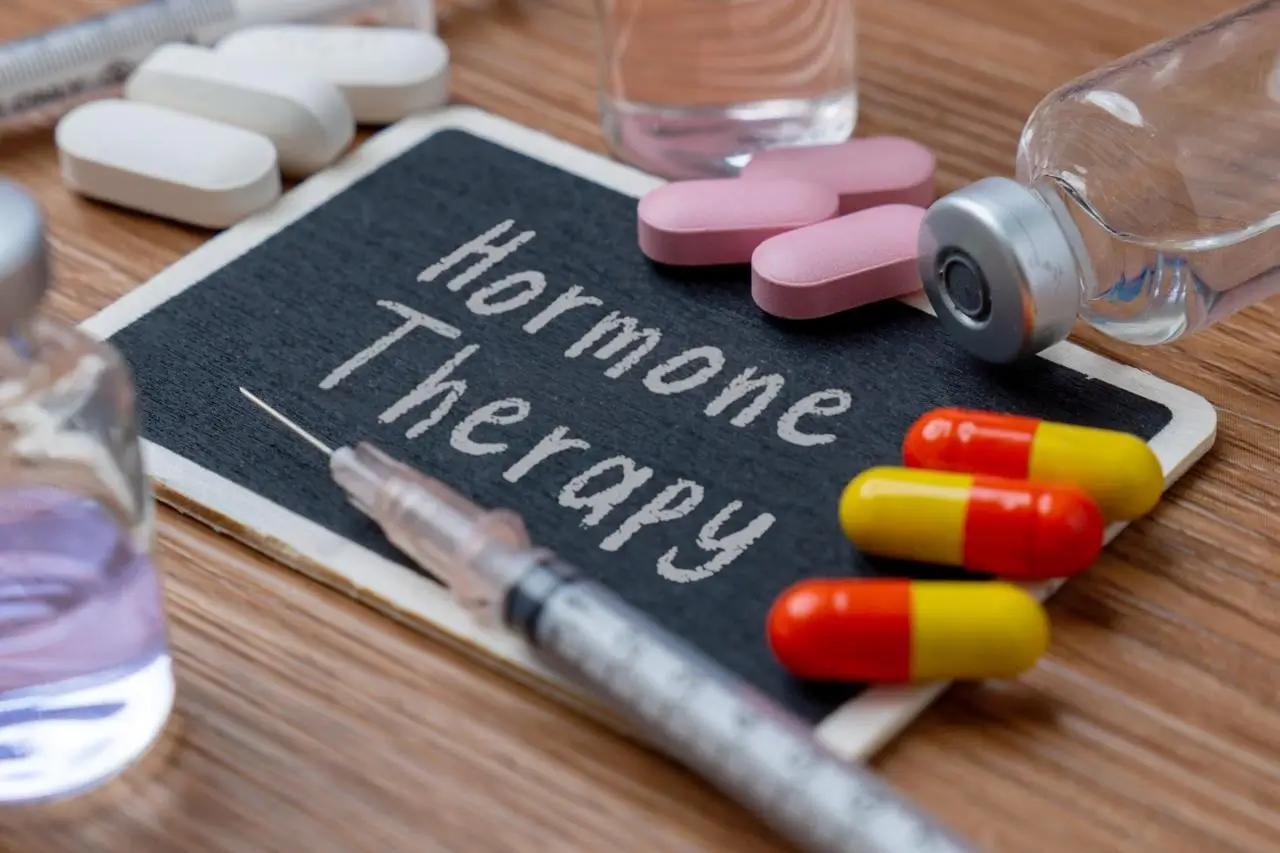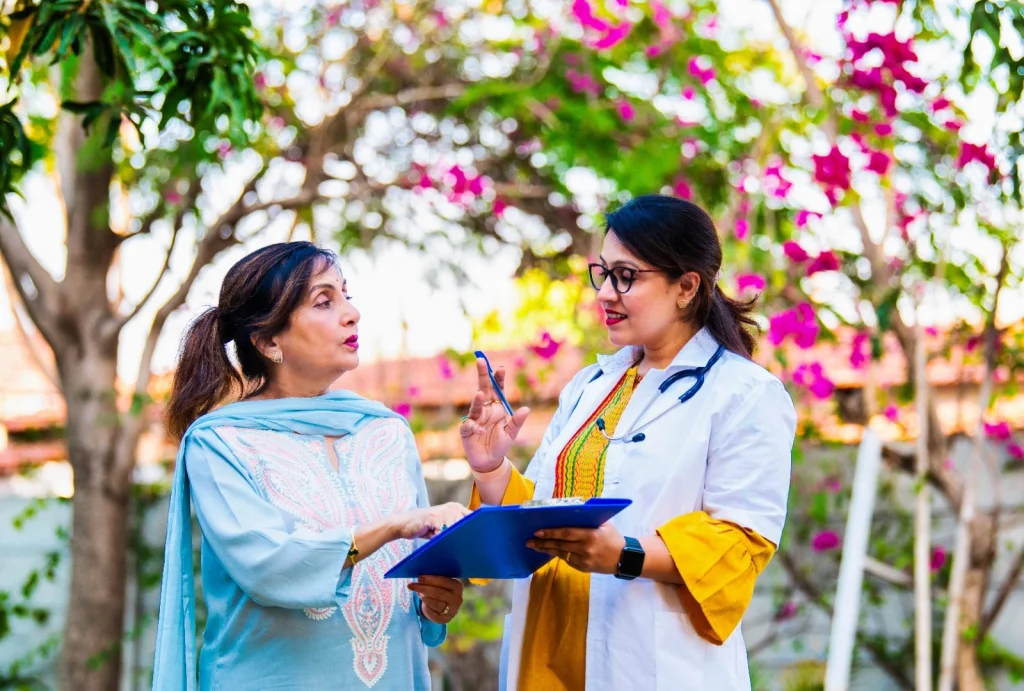

For most women, menopause isn’t something we talk about often — and when we do, it’s usually whispered, joked about, or brushed off as a “natural part of aging.” But here’s the truth: menopause isn’t the end of something — it’s the start of a whole new chapter.
And what’s truly surprising? Indian women reach menopause earlier than women in most Western countries.
Let’s unpack the science, the stories, and the subtle shifts behind this important milestone — and why knowing the average age of menopause in India could change the way you care for your health today.
Recent studies reveal that the average age of menopause in India is around 46.2 years, nearly five years earlier than the global average of 51 years.
According to the Indian Menopause Society (IMS) and several large-scale studies, many Indian women begin experiencing perimenopausal symptoms — like irregular cycles, mood fluctuations, or night sweats — as early as their early 40s, with complete cessation of periods typically by the mid to late 40s.
In contrast, women in countries like the U.S. or the U.K. often transition into menopause closer to 50–52 years.
That’s a significant difference — and it’s not just a biological curiosity. It’s a health signal.
Menopause isn’t a sudden event. It’s the result of a gradual decline in ovarian function — and several interconnected factors influence when this transition begins.
Let’s look at what research says about why Indian women, on average, reach menopause earlier.
Diet plays a crucial role in hormonal health.
Many Indian women, especially in rural or lower-income groups, experience micronutrient deficiencies (like Vitamin D, Calcium, Iron, or B12), which can affect ovarian reserve and hormone production.
Add to that irregular eating patterns, limited protein intake, and high stress — and the result can be a faster depletion of reproductive hormones.
Genetics play a significant role too.
South Asian women, studies show, tend to have a shorter reproductive lifespan compared to Caucasian women, due to both genetic predisposition and environmental stressors.
Stress — physical, mental, and emotional — impacts our endocrine system directly.
Early life hardships, poor sleep quality, and the constant multitasking that defines the lives of Indian women can lead to increased cortisol levels, which in turn accelerate hormonal imbalance and reproductive aging.
Exposure to endocrine-disrupting chemicals (found in plastics, processed foods, and pollutants) has been linked to earlier ovarian decline.
Urban Indian women, especially those in metropolitan cities, often report earlier perimenopausal symptoms than expected, pointing to the role of environmental toxins in hormonal disruption.
Interestingly, underweight women and those with extreme weight fluctuations tend to experience menopause earlier.
Conversely, higher body fat (while posing other metabolic risks) can sometimes delay menopause slightly due to higher estrogen storage in adipose tissue.
Menopause marks the end of menstruation, but it’s not the end of womanhood, vitality, or femininity.
It’s a hormonal shift — one that affects your body, mind, and even how you experience yourself.
Let’s look at what this transition actually means.
During perimenopause, estrogen and progesterone — your two key reproductive hormones — begin to fluctuate unpredictably.
This causes the classic symptoms: hot flashes, mood swings, irregular periods, and sometimes brain fog or fatigue.
The drop in estrogen affects serotonin and melatonin, making sleep and emotional balance harder to maintain.
No, it’s not “just stress.” It’s chemistry. And it’s real.
Lower estrogen also means lower bone density and higher risk of cardiovascular changes.
That’s why lifestyle choices — from nutrition to exercise — matter even more post-40.
Declining estrogen affects collagen, hydration, and circulation. Skin becomes thinner, hair texture may change, and libido might dip — all part of the hormonal recalibration.
The good news? With awareness and the right support, you can manage these changes gracefully — and even feel better than before.
Most women in India still don’t talk about menopause until it happens — often confusing symptoms like fatigue, anxiety, or irregular bleeding with stress or thyroid issues.
But when menopause arrives earlier, the consequences extend beyond symptoms.
Bone Health: Earlier loss of estrogen increases the risk of osteoporosis.
Heart Health: Estrogen protects against bad cholesterol; its decline raises cardiovascular risks.
Metabolic Health: Blood sugar fluctuations and weight gain become more common.
Emotional Health: Anxiety, mood swings, and brain fog can intensify without hormonal balance.
In short, early menopause isn’t a disease — but it’s a sign your body needs extra attention and support.
Multiple Indian studies have confirmed this pattern:
A 2021 study published in the Journal of Mid-life Health reported the mean menopausal age in India as 46.2 years, based on a cross-section of urban and rural populations.
Research by the Indian Council of Medical Research (ICMR) found that urban women typically reach menopause at 46.8 years, while rural women experience it around 44.9 years.
A study from AIIMS Delhi noted that low BMI, poor nutrition, and early menarche (first period) are correlated with earlier menopause onset.
Comparative data from The North American Menopause Society highlights that the global average age is 50–51 years, marking a significant gap of 4–5 years for Indian women.
So yes — the science confirms what generations of women have quietly known:
Indian women go through menopause younger, often without the support or awareness they deserve.
Menopause is not something to “fix.” It’s something to flow through — with the right tools, nutrients, and mindset.
Here’s what experts recommend:
Focus on foods rich in:
Phytoestrogens (soy, flaxseeds)
Calcium & Vitamin D3 (leafy greens, sesame, fortified milk)
Magnesium & Zinc (nuts, lentils)
Protein & healthy fats (to stabilise metabolism and mood)
Regular strength training, yoga, and walking can maintain bone density, regulate cortisol, and improve mood.
Prioritize winding down — meditation, herbal teas, or supplements with Ashwagandha or Magnesium Glycinate can help.
Speak to your gynaecologist or endocrinologist. Tracking hormones, thyroid, and bone density post-40 can make all the difference.
When diet alone isn’t enough, natural, clinically formulated supplements like Miror Bliss can bridge the gap — supporting sleep, hot flashes, bone health, and hormonal balance, without harsh side effects.
Menopause isn’t something that happens to you — it’s something you move through.
It’s the body saying, “You’ve nurtured, built, and balanced — now it’s time to nurture yourself.”
So, if you’re in your 40s and wondering whether those changes in your mood, cycle, or sleep are just “in your head,” they’re not.
They’re part of a deeply human, beautifully natural transition.
And the more you understand it, the more power you have to make it your season of strength.
| Region | Average Age of Menopause | Source |
|---|---|---|
| India | 46.2 years | Indian Menopause Society, 2021 |
| Rural India | 44.9 years | ICMR Study |
| Urban India | 46.8 years | AIIMS Delhi |
| Global Average | 50–51 years | North American Menopause Society |
You deserve to enter this new chapter not with fear — but with confidence, calm, and clarity.
Because balance isn’t a luxury; it’s your birthright.
Let’s make menopause less of a mystery and more of a movement — one conversation, one woman, and one moment of self-care at a time.
Yes. Studies show that Indian women entering menopause before 45 have a higher lifetime risk of osteoporosis, heart disease, and cognitive decline due to prolonged low estrogen exposure. While genetics can’t be changed, modifiable factors like adequate calcium, vitamin D3, protein intake, stress management, and avoiding smoking or excessive caffeine can delay menopause by up to 1.5 years. Regular strength training and balanced sleep cycles also protect ovarian health.
Surprisingly, yes. Research (AIIMS, 2018) found that strict vegetarians had a slightly earlier menopause onset (by 0.8–1 year) compared to women with moderate dairy or egg intake. This is often due to lower intake of amino acids, zinc, and B12, all essential for ovarian hormone synthesis.
It doesn’t mean you need to eat meat — but diversifying plant proteins (like lentils, soy, and seeds) and ensuring micronutrient-rich foods can support hormonal longevity.
Some Ayurvedic herbs — notably Shatavari, Ashoka, and Lodhra — have shown promise in supporting estrogenic balance and reducing premature ovarian decline.
While these herbs can’t “stop” menopause, they may help sustain healthy cycles and reduce stress-related hormonal depletion, especially when taken in standardized, clinically formulated blends (like in Miror Bliss). Always consult your gynecologist before starting herbal supplementation.
That’s called perimenopause — and it can last anywhere from 2 to 10 years.
Indian women often enter perimenopause in their late 30s to early 40s, where estrogen begins to fluctuate erratically. You may still get periods, but experience symptoms like hot flashes, mood swings, brain fog, or joint pain.
Recognizing this early phase helps you take preventive steps — like nutrition correction, magnesium or ashwagandha support, and bone health tracking — before menopause officially begins.
Fascinatingly, yes. Hot flashes and night sweats are thermoregulatory symptoms — and tropical heat + humidity can intensify them. Research comparing Indian and Scandinavian women found that Indian participants reported more frequent and longer-lasting vasomotor episodes due to environmental heat stress.
Simple cooling strategies such as lightweight clothing, hydration with electrolytes, magnesium-rich diets, and night-time temperature control — can help manage these climate-linked flare-ups.



 ×
×

